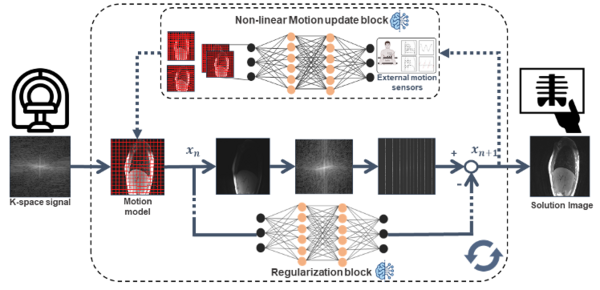MEDICARE: Motion intEgrateD aI-based CardiAc mRi rEconstruction (BMBF, MESRI)
Magnetic Resonance Imaging (MRI) has transformed cardiac imaging, offering non-invasive and detailed visualization of the heart's structure and function. MRI's exceptional soft tissue contrast allows for an accurate assessment of cardiac anatomy, blood flow dynamics, and myocardial viability. However, a significant challenge in cardiac MRI is the long scan times due to multiple image acquisition over several heartbeats. Factors like breath-holding, high-resolution requirements, and heart motion complexity contribute to this extended duration, leading to patient discomfort and motion artifacts that can degrade image quality. Ongoing advancements, including accelerated imaging techniques and motion correction algorithms, aim to reduce scan times and unlock the full potential of cardiac MRI, enhancing cardiovascular disease management and diagnostic precision.
This project aims to develop a Motion Integrated AI-based cardiac MRI reconstruction technique that enables accurate whole-heart cardiac imaging during free breathing. To achieve this goal we will pursue the following objectives:
- Develop an accelerated AI-based MRI reconstruction pipeline incorporating uncertainty modeling into the analysis to enhance the trustworthiness of image quality
- Advance MRI reconstruction of subtle abnormal anatomical details to avoid bias of healthy tissues in AI models and improve clinical reliability
- Develop and incorporate AI-based 4D motion prediction with faster sparse k-space sampling for MRI acquisition
- Enhance the explainability of AI methods for MR image processing by combining AI-based feature extraction with robust graph-based optimization strategies
Selected Publications:
Blendowski, M., Bouteldja, N. & Heinrich, M. P. Multimodal 3D medical image registration guided by shape encoder–decoder networks. Int J Comput Ass Rad 15, 269–276 (2020).
Bigalke, A., Hansen, L. & Heinrich, M. P. Adapting the Mean Teacher for keypoint-based lung registration under geometric domain shifts. Arxiv (2022) doi:10.48550/arxiv.2207.00371.
Blendowski M, Nickisch H, Heinrich MP. How to learn from unlabeled volume data: Self-supervised 3d context feature learning. InInternational Conference on Medical Image Computing and Computer-Assisted Intervention 2019 Oct 10 (pp. 649-657). Cham: Springer International Publishing.
Küstner, T. et al. CINENet: deep learning-based 3D cardiac CINE MRI reconstruction with multi-coil complex-valued 4D spatio-temporal convolutions. Sci Rep-uk 10, 13710 (2020).
Project Team:
![[Translate to english:] P71 OncoReg [Translate to english:] P71 OncoReg](/fileadmin/_processed_/e/c/csm_csm_label_mi_master_01_19a959dd26_0edd5d1b1c.jpg)
- Research
- AI und Deep Learning in Medicine
- Medical Image Processing and VR-Simulation
- Integration and Utilisation of Medical Data
- Sensor Data Analysis for Assistive Health Technologies
- Medical Image Computing and Artificial Intelligence
- Medical Data Science Lab
- Medical Deep Learning Lab
- Junior Research Group Diagnostics and Research of Movement Disorders
- Former Medical Data Engineering Lab

